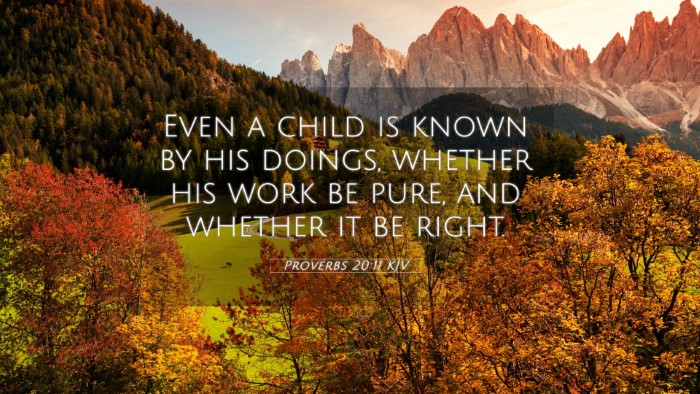Understanding Proverbs 20:11
Proverbs 20:11 states, "Even a child is known by his doings, whether his work be pure, and whether it be right." This verse emphasizes the importance of a child's actions in reflecting their character and integrity.
Verse Meaning and Interpretation
The essence of Proverbs 20:11 can be understood through various commentaries that shed light on its implications:
- Matthew Henry: Henry points out that children, even in their youth, exhibit traits that reveal their character. Their actions, whether good or bad, serve as indicators of their morality. This verse serves as a reminder that a child's behavior should not be overlooked, as it predicts future conduct.
- Albert Barnes: Barnes elaborates on the notion that actions serve as a reflection of one’s inner moral quality. He notes that even premature judgment may be warranted based on observable deeds. Further, this verse underlines parental responsibility in guiding children's actions towards righteousness.
- Adam Clarke: Clarke interprets the phrase "known by his doings" as a stark reminder of accountability. He emphasizes that the deeds of children can either honor or dishonor the family name and the values taught to them. Clarke suggests that right conduct is essential in establishing a foundation for a child's future.
Bible Verse Cross-References
In understanding the implications of Proverbs 20:11, we can draw connections to several other scriptures that reinforce similar themes:
- Matthew 7:16: "Ye shall know them by their fruits." This emphasizes the idea that one’s character is revealed through actions.
- 1 Samuel 16:7: "For the Lord seeth not as man seeth; for man looketh on the outward appearance, but the Lord looketh on the heart." This verse highlights that while actions display character, true intentions lie deeper.
- Galatians 5:22-23: "But the fruit of the Spirit is love, joy, peace, longsuffering, gentleness, goodness, faith, meekness, temperance." These fruits exhibit moral qualities that align with the purity and righteousness discussed in Proverbs 20:11.
- Ephesians 6:1: "Children, obey your parents in the Lord: for this is right." This verse underscores the nurturing of good deeds in children through obedience, tying back to the concept of righteous actions.
- Proverbs 22:6: "Train up a child in the way he should go: and when he is old, he will not depart from it." This emphasizes parental guidance in instilling the values that promote right actions.
- James 2:17: "Even so faith, if it hath not works, is dead, being alone." This connection stresses the critical relationship between actions and beliefs.
- Colossians 3:20: "Children, obey your parents in all things: for this is well pleasing unto the Lord." This verse reinforces the idea that obedience and good works reflect a child's character.
Thematic Connections
The meaning of Proverbs 20:11 aligns with several themes found throughout the Bible, reflecting the interconnectedness of scriptural teachings:
- Character Development: The Bible often emphasizes that a person’s character is revealed through their deeds, corroborating the teaching found in James and Matthew.
- Parental Guidance: Many verses encourage parents to nurture righteous behaviors in children, as reflected in Proverbs and Ephesians.
- Accountability: The actions of both children and adults confirm that righteousness is a key biblical principle reflected throughout different books.
In conclusion, Proverbs 20:11 serves as a profound reminder of the importance of our actions as reflections of our character, whereby even children carry the potential to display integrity or misdeed. The interconnectedness of scriptural verses calls for deeper exploration through cross-referencing and comparative analysis, facilitating a rich understanding of Biblical wisdom.











